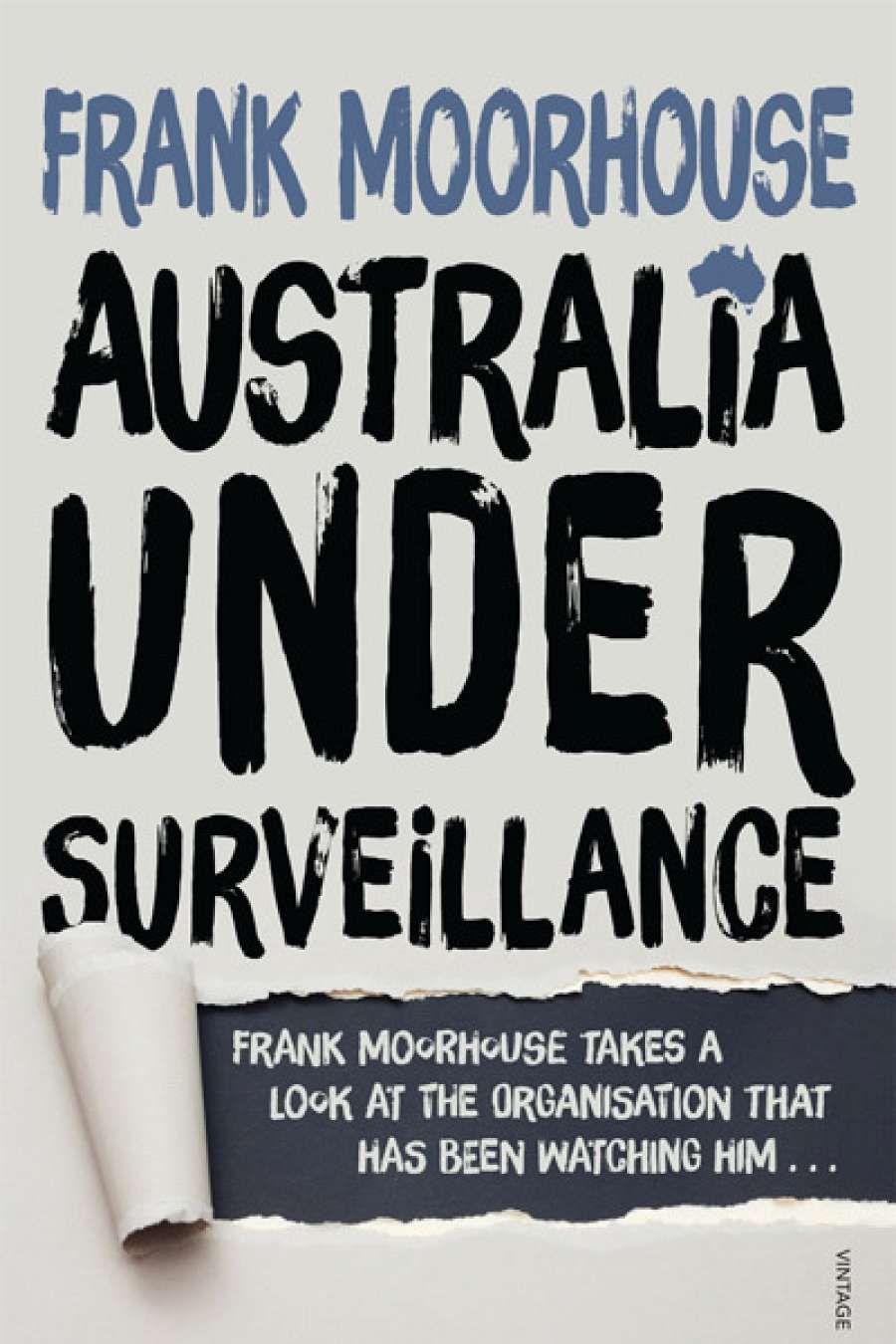
- Free Article: No
- Contents Category: Politics
- Custom Article Title: David Rolph reviews 'Australia Under Surveillance' by Frank Moorhouse
- Review Article: Yes
- Online Only: No
- Book 1 Title: Australia Under Surveillance
- Book 1 Biblio: Vintage, $32.99 pb, 320 pp, 9780857985972
Certainly, one ongoing feature of national security during that time has been ASIO. In examining the role of ASIO, Moorhouse focuses on the gradual erosion of common law rights and liberties – rights and liberties which have developed over centuries, such as the right to silence and the right to legal representation – from the Howard government onwards. He considers the growth in security agencies and their rapid accumulation of additional powers in the stated interest of national security. He ponders whether this volume of legislation, designed to combat terrorism, can change the political character of Australia. This leads him to ask whether we are effectively legislating ourselves into a national security state. These issues are important to all Australians because, as Moorhouse suggests: ‘While we may not all be experts in law or politics (although god knows we try), we are all experts in freedom – both in the taking away of it and sometimes the winning of it back.’
Moorhouse states at the outset that his book is not an attack on ASIO but rather a consideration of the human limitations of such an organisation. He acknowledges that secrecy is essential to ASIO’s functions, but is concerned about the lack of accountability when mistakes are made. In this context, Moorhouse explores the role of the Inspector-General of Intelligence and Security, an office designed to demand a measure of accountability from ASIO. Moorhouse has understandable concerns about its efficacy. The centrepiece of the book is a fascinating interview Moorhouse conducted with ASIO’s Director-General, David Irvine. The interview, along with other public speeches by Irvine, seems designed to enhance ASIO’s openness within the obvious constraints of secrecy. The extent to which this approach can be effective is limited – a security agency is necessarily secret – but it is an important, if modest, gesture. The tension, though, between secrecy and accountability is real.
Moorhouse’s book is a nuanced, thoughtful account not only of ASIO and its role in national security but of the impact that national security has upon fundamental freedoms and values. Moorhouse is particularly insightful on the tension between national security and freedom of expression. He differentiates between different types of speech, willing to be more absolutist in protecting speech about sexual matters, striking a different balance when dealing with terrorist speech. He is critical of religious and racial vilification laws which impose liability for conduct which is merely offensive or insulting. Moorhouse is sceptical about the invocation of freedom of speech by some commentators, rightly pointing to their selectivity in their free speech concerns. He goes further and questions the assertion that freedom of speech is a fundamental feature of the West, instead suggesting that ‘[t]he Western tradition is a tradition of dispute about free speech, not a free-speech heritage’.
Governments have long attempted to suppress various forms of speech. The value of free speech has been honed through resisting the governmental attempts over centuries to limit or prohibit different types of speech. Recognising this does not diminish the value of freedom of speech. Rather, it reflects the reality that the value of freedom of speech is not immutable but has consistently been contested politically.
 Frank Moorhouse (photograph by Melinda Smith)
Frank Moorhouse (photograph by Melinda Smith)
Moorhouse is also sceptical about the need to protect privacy through new legislation. In his view, protecting privacy would be inimical to personal freedom and openness and transparency of government. He is critical of the Australian Law Reform Commission’s 2008 three-volume report. Moorhouse understates the extent to which law reform bodies have been interested in privacy. In the last ten years alone, the ALRC has reported on this issue twice, the New South Wales Law Reform Commission and the Victorian Law Reform Commission has reported once each, and a parliamentary committee in New South Wales is currently investigating whether a statutory cause of action for invasion of privacy needs to be introduced, particularly to address concerns about technological intrusions upon privacy. This represents a lot of law reform activity without any legislative change – a position which seems unlikely to change soon.
It is often suggested that one of the major obstacles to protecting privacy through law is the difficulty of defining privacy. Privacy is a loaded word and is often used as a shorthand expression when people feel violated in some other way. Often, what people are concerned about is not exactly that their privacy has been invaded but, more accurately, that their autonomy – their right to make choices about what should or should not be disclosed about them, who should or should not know or collect information about them – has been infringed. Viewed in that way, ‘privacy’ or autonomy arguably becomes important in determining what rights a citizen should have to resist government surveillance of their lives.
The balances that Moorhouse explores in Australia Under Surveillance – between openness and secrecy, between security and freedom, between the individual and the state – are variable and politically contested, as he recognises. They should be the stuff of political debate, but too often they are not. Lucid critical thinking, such as that provided by Moorhouse in this book, can only enhance that discussion.


Comments powered by CComment